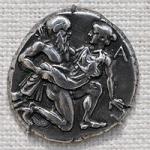Disable ads!
Archilochus
This couplet testifies to a social revolution: Homer's poetry was a powerful influence on later poets and yet in Homer's day it had been unthinkable for a poet to be a warrior. Archilochus deliberately broke the traditional mould even while adapting himself to it: "Perhaps there is a special relevance to his times in the particular gestures he elects to make: the abandonment of grandly heroic attitudes in favour of a new unsentimental honesty, an iconoclastic and flippant tone of voice coupled with deep awareness of traditional truths." Ancient authors and scholars often reacted to his poetry and to the biographical tradition angrily, condemning "fault-finding Archilochus" for "fattening himself on harsh words of hatred" (see Pindar's comment below) and for "the unseemly and lewd utterances directed towards women", whereby he made "a spectacle of himself" (Plutarch de curiositate 10.520a-b). He was considered "...a noble poet in other respects if one were to take away his foul mouth and slanderous speech and wash them away like a stain" (Suda). According to Valerius Maximus, the Spartans banished the works of Archilochus from their state for the sake of their children "...lest it harm their morals more than it benefited their talents." Yet some ancient scholars interpreted his motives more sympathetically: "For of the two poets who for all time deserve to be compared with no other, namely Homer and Archilochus, Homer praised nearly everything...But Archilochus went to the opposite extreme, to censure, seeing, I suppose, that men are in greater need of this, and first of all he censures himself...", thus winning for himself "...the highest commendation from heaven."—Dio Chrysostom
 Read more on wikipedia.org Read more on wikipedia.org
 All quotes by Archilochus All quotes by Archilochus
 Edit Edit
|

|
|
|
|
|
Background photo by Giuliana
|